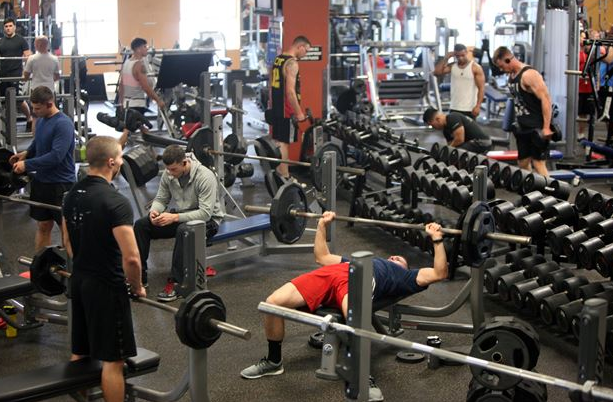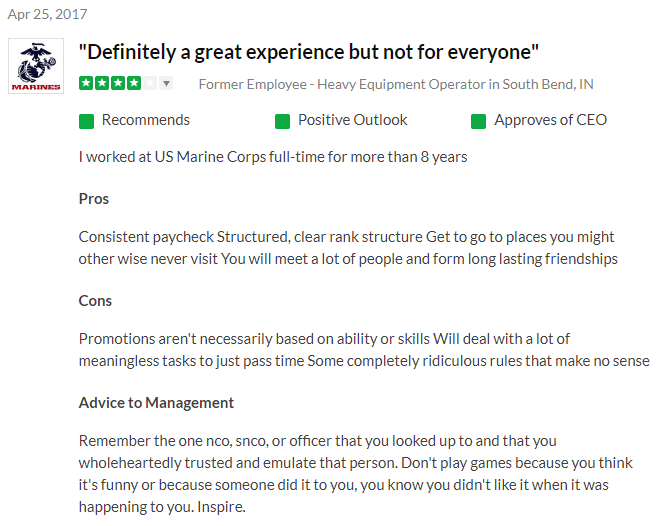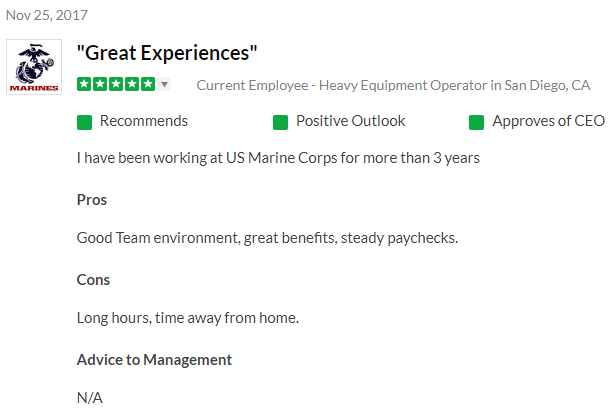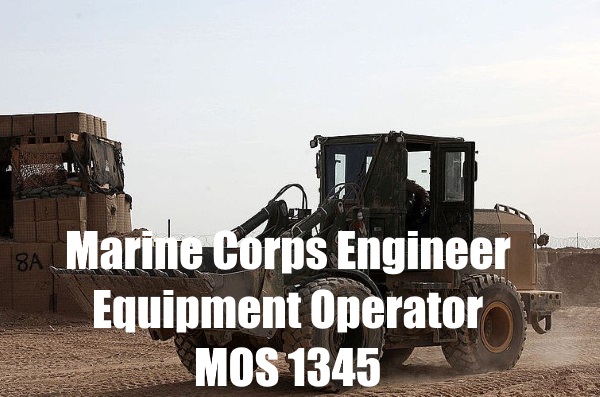Engineer equipment operators are specialists in the U.S. Marine Corps who utilize heavy, construction, equipment to accomplish various tasks.
These tasks may be as simple as moving a few pallets of water to help a unit prepare for a deployment, to something more complicated like building a stretch of road on a remote island in the Pacific Ocean.
Equipment operators must understand all the capabilities of their equipment to ensure the equipment is never overworked or at risk of being damaged.
Potential operators will attend a short training school in preparation for working in the fleet Marine force.
Related Article – Marine Corps MOS List and ASVAB Scores: Details Of All 123 Jobs
Engineer equipment operators are utilized both on the airwing and ground side of the Marines, both at home bases and while deployed abroad.
This means that Marines in the 1345 military occupational specialty (MOS) can be stationed at a plethora of bases around the world.
Additionally, they work with a wide assortment of other Marine MOS’ and learn a valuable skillset that can be used upon completion of their service contract.
Jump To A Section
Requirements and Qualifications
Training And Career Path
Salary
What’s Life Like As An MOS 1345
Civilian Career Opportunities
Requirements and Qualifications
- Must be a member of the United States Marine Corps
- Available for Marines between the ranks of private and staff sergeant
- Score at least a 95 on the mechanical maintenance section of the ASVAB
- Be at least 66 inches tall
- Vision correctable to 20/20 is required
- Normal color vision is required
- Successfully complete Army Basic Operator Course at Fort Leonard Wood, MO
- Marine reserves may be required to complete a form of on the job training known as ATIP (Alternate Training Instructional Program). This will be performed by the specific unit, over a set period of time, if the Marine is unable to fill a slot at the Basic Operator Course.
Training and Career Path

For anyone interested in being an equipment operator in the U.S. Marines, they must first complete Marine basic training in either South Carolina or San Diego.
Related Article – Hollywood Marines: San Diego Vs. Parris Island Marines
Following graduation from basic training, all Marines attend Marine Combat Training for 4 weeks where they will learn basic rifleman maneuvers.
Upon successful completion of the previous training, potential engineer equipment operators will attend the Basic Engineer Equipment Operator course in Fort Leonard Wood, Missouri.
The course will take approximately 45 days to complete once a Marine is selected into a class and assigned a start date.
Start dates can be delayed due to holidays, special events, and class sizes.
While at the school, Marines will undergo practical and written testing on a multitude of equipment.
Related Article – Vet Tix Review: Your Go-To Guide
A new type of equipment will be introduced at the start of each week, as long as Marines continue to show a thorough understanding and basic mastery on each piece of equipment.
The school will start operators off with easier equipment, basic forklifts and front-end loaders, and slowly progress towards more difficult and advanced machines, bulldozers and road graders, that take more aptitude and dexterity to master.
Days are regularly spent in a piece of equipment where the Marine will operate it repeatedly for several hours a day.
Fellow classmates will rotate through the equipment while testing one another on the basic knowledge of equipment between operating.
A basic understanding and preparation for working as an engineer equipment operator will be established through this method of instruction.
In addition to proving mastery of the equipment through skills testing, Marines will be expected to take weekly written tests for the piece of equipment being covered for that week.
The length of the tests will vary, but general knowledge of the machine will be tested.
Class time is a normal part of the school, so all the information needed to pass the written tests will be covered thoroughly before the actual exam at the end of the week.
Some questions that may be asked are things like; what is the oil capacity for a front-end loader, what is the lifting capacity of a loader, what is the torque and horsepower of a loader, etc.
How Much Are They Paid?
Generally, a new Marine will hit MOS school as an E2, private first class.
Some Marines, with college credits or other special circumstances, will enter the marine corps as an E2, so will oftentimes be promoted to an E3 before MOS school starts.
This means that nearly all Marines, and potential Marines, that become equipment operators will do so with less than 2 years of time in service between the ranks of E1 to E3.
The pay for those parameters for 2019 is as follows:
- E1 (4+ months): $1681 per month
- E2: $1884 per month
- E3: $1981 per month
- E4: $2195 per month
Now, before you get too focused on the numbers, it is important to remember that this is your take home base pay. In addition to this pay, Marines receive full medical, dental, and vision coverage.
A fully functioning sleeping quarters is always provided, while in garrison, and there is an option for 3 free meals per day.
Additionally, there are state of the art gyms, swimming pools, and endless classes that Marines can participate in while on base.

Engineer equipment operators do not receive any monthly incentive pay like a few other select MOS’.
Day in the Life of a Marine Engineer Equipment Operator
Once a Marine has successfully completed MOS school, they will join the Fleet Marine Force, aka be assigned to a unit.
An engineer equipment operator (MOS 1345) can be assigned to units ranging from light armored reconnaissance, to combat engineer battalions, to Marine wing support squadrons, to combat logistics regiments.
The 1345 MOS specialty is needed all over the Marine Corps and there is no shortage of ways that equipment operators can be utilized.
Equipment operators assigned to wing support squadrons or combat logistics regiments will spend substantial hours in their days working on flight lines.
There is always equipment needing transported to some point in the world, and equipment operators will work diligently with embark Marines to ensure pallets are prepared and loaded onto the right planes, flatbed 7-ton trucks, or helicopters.
Hours can be long and arduous while on the flight line, but operators who are working in this environment will know that they are playing a pivotal role in supplying Marines around the world with fresh gear.
The following online reviews illustrate the fact that heavy equipment operators are in high demand, are very busy, and may end up traveling more than some other MOS’.


Operators working for combat engineer battalions and light armored reconnaissance will do some work with logistics and loading pallets but will generally find more opportunities to do training on route clearance, building demolition, and tactical maneuvers.
They will get to work with dozers, scrapers, and other dirt moving equipment to practice clearing roadways of possible threats.
Additionally, operators assigned to these units may get to do some cross training with combat engineers and other MOS’ that they are working closely with.
The equipment, that operators learn at the Basic Operator School, are just a small portion of the equipment that will be encountered in the FMF.
Training won’t stop once you get to your unit, and oftentimes, Marines will be given many additional licenses through the training NCO at their unit.
Slow days at the shop may even lead to training opportunities, or competition among operators to see who can complete a makeshift obstacle course the fastest.
All in all, the daily life of an equipment operator is largely affected by whatever unit they are assigned too.
Either way, they are always in demand and will usually maintain a very busy day to day schedule, sometimes even working through weekends to complete a large embarkation.
Civilian Career Opportunities
Equipment operators enjoy a comfortable lifestyle in the civilian sector.
Most employers seek operators with some prior experience, so time spent operating in the military is a great launching point for a career as a civilian operator.
The median salary for construction equipment operators is $46,990 per year according to recent projections by the Bureau of Labor Statistics.
They will enjoy a moderate job growth of around 12% across the nation.
These projections can be higher or lower depending on the equipment being operated and the difficulty of the project being worked on.
Additionally, the Marines use all-terrain mobile cranes which can be a phenomenal starting point for anyone interested in becoming a crane operator as a civilian.
Generally, only NCOs and senior Lance Corporals will have the opportunity to earn a crane license but this is unit specific.
Crane operators need to be licensed in the civilian sector through the National Commision for the Certification of Crane Operators (NCCCO).
The NCCCO will let military personnel, with crane operating experience, test out on the crane style that was utilized in the Marines, upon completion of active duty.
For more advanced cranes, Marines are encouraged to research operator schools where they can utilize the Post-9/11 GI Bill for certified training programs.
Crane operators enjoy a comfortable salary of $58,160 annually.
Have A Question About Marine Engineer Equipment Operators? Leave It In The Comments Below!
References
https://www.cool.navy.mil/usmc/enlisted/1345.htm
- 5 Best Jobs for Female Marines - June 20, 2024
- 10 Best Marine Corps Recruiting Videos of All Time - June 20, 2024
- Marine Corps Requirements - June 20, 2024
Originally posted on June 17, 2019 @ 1:50 am
Affiliate Disclosure: This post may contain affiliate links. If you click and purchase, I may receive a small commission at no extra cost to you. I only recommend products I have personally vetted. Learn more.
